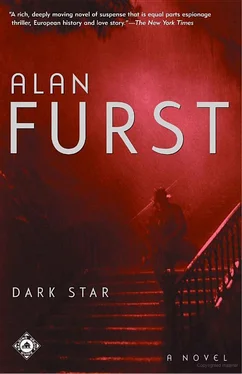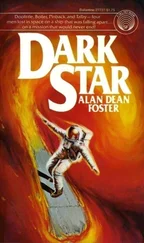Alan Furst - Dark Star
Здесь есть возможность читать онлайн «Alan Furst - Dark Star» весь текст электронной книги совершенно бесплатно (целиком полную версию без сокращений). В некоторых случаях можно слушать аудио, скачать через торрент в формате fb2 и присутствует краткое содержание. Жанр: Шпионский детектив, на английском языке. Описание произведения, (предисловие) а так же отзывы посетителей доступны на портале библиотеки ЛибКат.
- Название:Dark Star
- Автор:
- Жанр:
- Год:неизвестен
- ISBN:нет данных
- Рейтинг книги:3 / 5. Голосов: 1
-
Избранное:Добавить в избранное
- Отзывы:
-
Ваша оценка:
- 60
- 1
- 2
- 3
- 4
- 5
Dark Star: краткое содержание, описание и аннотация
Предлагаем к чтению аннотацию, описание, краткое содержание или предисловие (зависит от того, что написал сам автор книги «Dark Star»). Если вы не нашли необходимую информацию о книге — напишите в комментариях, мы постараемся отыскать её.
Dark Star — читать онлайн бесплатно полную книгу (весь текст) целиком
Ниже представлен текст книги, разбитый по страницам. Система сохранения места последней прочитанной страницы, позволяет с удобством читать онлайн бесплатно книгу «Dark Star», без необходимости каждый раз заново искать на чём Вы остановились. Поставьте закладку, и сможете в любой момент перейти на страницу, на которой закончили чтение.
Интервал:
Закладка:
“Love affair is a dramatic term, isn’t it, but what else could one call a relationship based on a deep and sympathetic understanding, a shared passion for certain ideals, a common view of the human race? Love affair describes it. Especially when you include such elements as secrecy. There’s always that in a love affair. Maybe one of the lovers is promised to somebody else, or it could be that the family doesn’t approve. Or maybe it doesn’t matter why -the two lovers want to meet but everything is in their way; they’re misunderstood, even hated, and all they want to do is unite, to become as one. It’s all so unfair.”
Von Polanyi paused, took a pack of Gitanes from a wooden box on the coffee table, and offered one to Szara. The same kind he’d smoked when he’d visited Dr. Baumann, naturally. After he’d lit Szara’s cigarette with a silver lighter, Von Polanyi continued. “Now if we are writing a play, the logical ending for such a love affair is doom. But, if we leave the theater and enter the world of politics, the doom may be for the world and not the lovers. Imagine that Shakespeare rewrote the final act of Romeo and Juliet: now the lovers poison the wells of Verona and, in the final scene, they’re all alone and living happily ever after.
“Well,” Von Polanyi said, “I suppose that’s the end of my literary career. Because the reality, I’m afraid, is not so amusing. The lovers, of course, are Joseph Stalin and Adolf Hitler. In August, their secret love affair ended with the announcement of an engagement-the Non-Aggression Pact-and a lavish engagement present: Poland. And this is merely the engagement. One may well ask what splendors are planned for the wedding itself!
“But that’s the future. For tonight, in the few hours we have, I want to talk about the past. But where to begin? Because this passion, this romance, does not confine itself to the lovers, it starts in the villages where they live and it starts a long time ago. Germany has always needed what Russia has: her oil, iron ore, rare metals and grain. And Russia has always needed what Germany has: our science and technology, our skills, the simple ability to get something done. A German sees a job that needs doing, he thinks a minute, rolls up his sleeves, spits on his hands, and-it’s done! When we try to go it alone, alas, when we exclude the world outside our borders, things don’t go so well. An example: our latest campaign is to get our people to eat rye bread, from grain we can grow ourselves, and to that end the Ministry of Propaganda is claiming that white bread weakened our soldiers in the 1914 war. Of course no one believes it.
“Now two countries like this, and practically next-door neighbors to boot-is it not a match that cries out to be made? It’s been tried before, but somehow it never seems to take. Catherine the Great imported Germans by the wagonload; they helped, but nothing really changed. A more recent example: in 1917, the German General Staff put old Lenin on an armored train and thus destroyed imperial Russia. Yet even so, the minute the world settled down, in 1922, they were at it again with the Treaty of Rapallo. Now we had the two most despised states in Europe rushing into each other’s arms-if nobody else will love me, surely this ugly old thing will!
“Poor Rapallo. Another treaty, another date to torment the student suffering over his history text. But this marriage is a little more interesting if you look under the covers. The German War Ministry forms a development company called GEFO and funds it with seventy-five million gold reichsmarks. This allows the Junkers company to build three hundred fighter aircraft at a Russian town called Fili, just outside Moscow. Germany receives two hundred and forty of them, the USSR gets sixty and the technology. Next comes a joint stock company called Bersol-by now our poor, suffering student is surely reeling. Perhaps reeling in fact, since Bersol undertakes the manufacture of poison gas at Trotsk, in the province of Samara. In 1925, in Tambov province, near the town of Lipetsk, the Lipetsk Private Flying School comes into existence. Rather nebulous, though known today as the Luftwaffe. By September of 1926, Russian freighters deliver three hundred thousand shells plus gunpowder and fuses to Germany, disguised as pig iron and aluminum. Can the poor student stand any more of this? Once you add the fact that the Heavy Vehicle Experimental and Test Station near the town of Kazan is in fact a site for Krupp and Daimler and Rheinmetall to build light tractors-tanks is a better description- probably not. It’s all so tiresome, unless of course the student goes to school in Prague. This goes on for twelve years. Germany rebuilds its forces; the two armies participate in exchanges of military officers, establishing facilities in both Berlin and Moscow. And that’s just the secret part of Rapallo. In full view of the world, the Russian wheat and ore boats travel west, the German technicians pack their little black bags and head east.
“When Hitler came to power, though, in 1933, all had to end. Here was Germany’s evil face, and the idealistic Soviet Union and its friends the wide world over had to be seen to turn away from it. Pity, because everything had been going so well.
“Any diplomat would say that such a moment, if nothing else can be done, is a time to keep a dialogue alive, but Hitler and Stalin shared a special and characteristic trait: they both believed that language was God’s gift to liars, words existed only to manipulate those who thought otherwise. Both these men had risen from the gutters of Europe-here I am partial to a Russian saying: power is like a high, steep cliff, only eagles and reptiles may ascend to it- and they believed diplomacy to be the tool of those who had historically kept them down, the intelligentsia, professors, Jews, all such people. But then, a problem: how could any sort of communication be achieved? Solution: only by deeds, by gestures, by irrevocable actions that made one’s intentions plain and clear. They certainly didn’t invent this method. Since the first days of the newspaper, nations have communicated in this way-on the third page, on the second page, on the first page. We must admit, though, that Hitler and Stalin used the method with some particular flair.
“In 1933, Stalin wasn’t quite sure what he was dealing with in Berlin. He’d read translations of Hitler’s speeches, maybe even his book, but, as I’ve said, what did that mean? Then, in 1934, something even Stalin could understand. The Night of the Long Knives, Hitler had a rival, Ernst Rohm, who led the Brown Shirts. What did he do about it? Murdered them. All the important ones, and all in one night. And so much for rivals. Well, Stalin felt, apparently, the first stirrings of romantic passion, because by December of that year he answered in kind. The assassination of Kirov was organized, and Stalin’s political rivals were eliminated in a purge that continued into 1936.
“Then it was Hitler’s turn. In 1936 he marched into the Rhine-land. He took territory. Once again, Stalin sat up and took notice. Found a way to express a kind of approval: the show trial of Kamenev and Zinoviev. That they were Jews is less important than Vyshinsky’s statement, at the trial, that they were Jews. Here we see Stalin beginning to come to grips with his real problem, which was very simply this: the twelve years of Rapallo had taught both countries that they could cooperate; now, how was that cooperation to be reinstated? Because, with Hitler in power, those two countries could rule the world if they worked together. They were, like lovers, made whole each by the other, and thus invincibly strong.
“But Stalin had a difficult problem, the fact that communism had traditionally been a religion of idealists. On one side of him was Tukhachevsky, Trotsky’s protege, and the most powerful figure in the Red Army. Tukhachevsky was young, handsome, brilliant, and courageous, proven in battle, beloved by his officers. At a show trial, he would have made mincemeat of an oily little opportunist like Vyshinsky and Stalin knew it. Now he needed help, and help was at hand. You’ll recall the officer exchanges that went on during the Rapallo period? Letters, orders, communications of various sorts, still existed in German files. At Stalin’s behest, certainly through NKVD intermediaries of the most trusted sort, Reinhard Heydrich and the Gestapo SD intelligence service found Tukhachevsky’s communications and remade them into forgeries proving that Tukhachevsky and four other Soviet marshals-two of them Jews! — had conspired with Hitler to overthrow the government of the USSR in a coup d’etat. Exit the marshals and most of the leadership of the Red Army. What did the world, the knowledgeable world, civil servants and journalists, think of this? That the conspiracy was born in Germany, a brilliant maneuver by the intelligence services to weaken the military leadership of the USSR. Certainly, except for Stalin at the bottom of it, it could seem that way.
Читать дальшеИнтервал:
Закладка:
Похожие книги на «Dark Star»
Представляем Вашему вниманию похожие книги на «Dark Star» списком для выбора. Мы отобрали схожую по названию и смыслу литературу в надежде предоставить читателям больше вариантов отыскать новые, интересные, ещё непрочитанные произведения.
Обсуждение, отзывы о книге «Dark Star» и просто собственные мнения читателей. Оставьте ваши комментарии, напишите, что Вы думаете о произведении, его смысле или главных героях. Укажите что конкретно понравилось, а что нет, и почему Вы так считаете.












